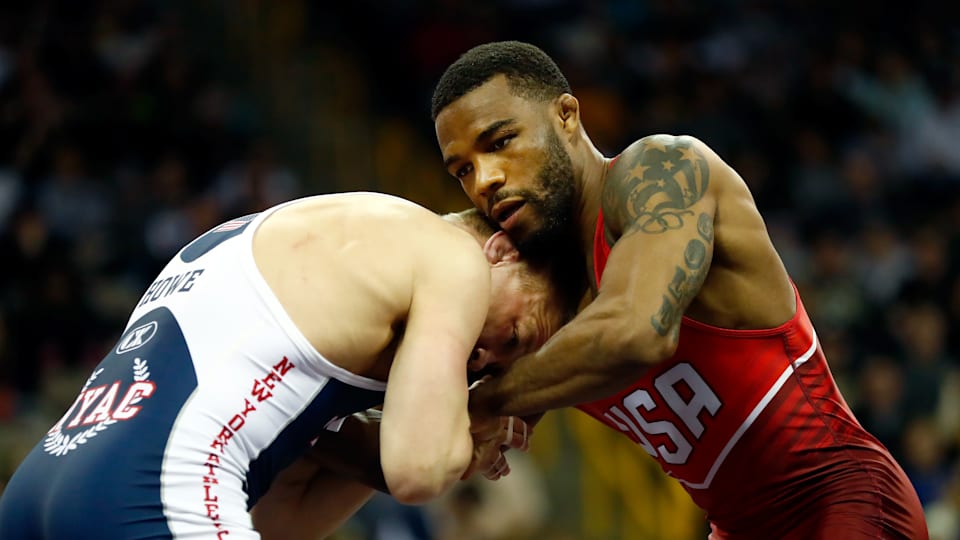What is Olympic State of Mind?
Jordan Burroughs, PV Sindhu, and other elite athletes demonstrate the tools you need to succeed and live your best life, using the new Bridgestone Olympic Channel experience.

Have you ever wondered how four-time wrestling world champion Jordan Burroughs stays so consistent?
Or perhaps how badminton star PV Sindhu handles the pressure of being one of India's top athletes?
How did Ariarne Titmus prepare to beat Katie Ledecky, causing the shock of the 2019 World Aquatics Championships?
The mental techniques these elite athletes, and many others utilise to become world beaters, are revealed in the new Bridgestone Olympic Channel experience: Olympic State of Mind.
What is Olympic State of Mind?
The Olympic State of Mind experience is an interactive set of tools including videos, articles, quizzes, and games featuring interviews with medical experts and sports stars.
The goal of Olympic State of Mind is to help people to become a better version of themselves in everyday life by employing three key sports psychology techniques used by Olympians:
- Mindfulness
- Visualisation
- Motivation
The wide variety of top talent to learn from includes Bridgestone athlete ambassadors Ariarne Titmus, Jordan Burroughs, PV Sindhu, Ai Ueda, Thomas Rohler, Kosuke Hagino, and Allyson Felix.
Mindfulness
Mindfulness is an individual's ability to be fully present, focusing on their immediate surroundings and what they are doing. This means not worrying about past events or things that are happening in the future.
The perceived benefits of mindfulness in sport and life include a higher level of concentration on the task at hand, while it can also help individuals to better manage stressful situations, by being more in control of their emotions.
"I think the best athletes in the world, really the the people in the world that are excellent at what they do are the people who can control their emotions." - London 2012 Olympic freestyle wrestling champion Jordan Burroughs
"Controlling them doesn't mean just blocking them out completely. It means feeling them and acknowledging them, but also not letting them affect your performance."
Visualisation
The technique of visualisation is simply when an individual imagines something they intend to make a reality.
For example, a long jump athlete would imagine what jumping a personal best distance would look and feel like, before actually competing.
It is a tool some individuals use to decrease anxiety or stress before a certain event. It can also be used to condition the brain for a successful outcome, and ensuring that their mind is fully concentrated on the task ahead.
The principle can transferred to any situation, from a sporting environment to delivering a speech, or even going into a business meeting.
"You could grow your business better just be visualising where you want to be." - Rio 2016 javelin gold medallist Thomas Rohler
Motivation
Motivation is the reason that an individual carries out an action.
It is important as an individual's motivation is what drives them to success, and maintains their dedication to their task. Without motivation, it can be very difficult to deliver an optimal performance.
"I have three main things that act as my sources of motivation," Japanese triathlete Ai Ueda told Olympic Channel.
"The first one is to have a dream to achieve. The second is to always stay positive and have a smile on your face. The third is not having limits. Don't create limits for yourself." - Ai Ueda, Japanese triathlete.
However, seeking out motivation can sometimes lead to an individual becoming overwhelmed by the extra pressure he or she puts on themselves to perform.
For example, a tennis player's motivation to win could be the desire to buy a bigger house for their family. But if the player doesn't succeed, then this desire can cause the player to lose focus on playing tennis, leading to a detrimental effect on their performance.
How to tap into your Olympic state of mind
The interactive experience launched on our special Olympic Channel microsite, presented by Bridgestone.
Keep an eye out for the video clips, articles, quizzes, and games for you to watch, read, and play, plus a special episode of the Olympic Channel Podcast.
